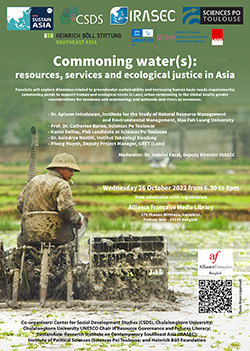Commoning Water(s) : Resources, Services and Ecological Justice in Asia
 Round table discussion (Alliance française de Bangkok, 26 October 2022)
Round table discussion (Alliance française de Bangkok, 26 October 2022)
00:00 Welcome speech and introduction of the round table
03:11 Can you provide a brief introduction, and share with us how your work interfaces with the concepts of commons and commoning ? Do you use this word/concept and is it something that you practice actively ?
16:50 Do you think that communing enables both the fulfillment of basic human needs (drinking water) and the long-term protection of ecosystem ?
30:24 How are the commons governed ? Articulation between different scales of decision making.
40:35 In your fieldwork, does the relation to the commons give rise to competition, is it based on social hierarchies or is there a place for horizontality, egalitarianism, and what we call democratic mechanisms for deliberation and collective action ? And when you encounter blockages linked to competition or conflicts how do you proceed to dialogue with the stakeholders ; what are your strategies as a facilitator ?
49:55 Questions from the floor
Inclusive and just water security is widely recognized as principal challenge in the era of the Anthropocene. Water insecurity affects the livelihoods of both rural and urban populations in Southeast Asia, and the wider the Global South.
This public event brings together academics and practitioners working on the frontiers of addressing the complex challenges and tensions surrounding water security and ecological justice. The roundtable panelists will explore how commoning approaches are emerging in Asian contexts to address these issues, which are being further exacerbated by climate change and increased urbanization. Panelists will explore the role of citizens, governments, and other actors in shaping the commons, the approaches that they have been working with both to secure water for basic human needs in the short term and to manage long-term ecological impact.











